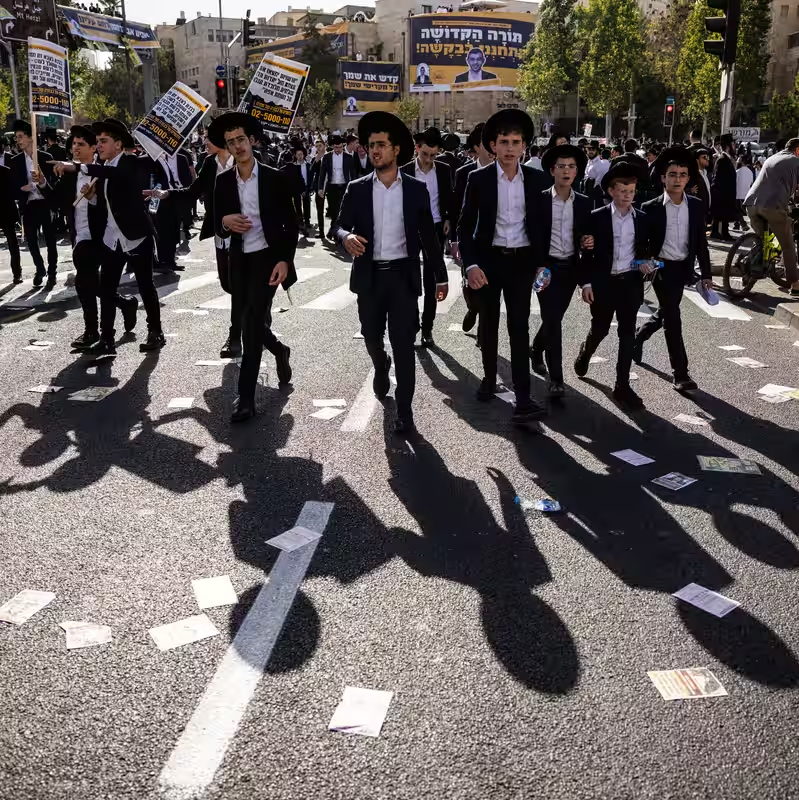Table of Contents
- A Sea of Black Hats Floods Jerusalem
- The Draft Exemption: A Century-Old Compromise
- Political Fallout and National Unity at Risk
- Voices from the Streets
- What Happens Next?
- Sources
Haredi ‘March of the Million’ Shakes Israel Over Draft Law
In one of the largest demonstrations in Israeli history, an estimated 700,000 to over a million ultra-Orthodox Jews—known as Haredim—flooded the streets of Jerusalem on Thursday, October 30, 2025, in a massive show of resistance against proposed legislation that would end their longstanding exemption from mandatory military service.
The protest, dubbed the “March of the Million” by organizers, brought the holy city to a standstill. Men in black coats and wide-brimmed hats, many clutching Torah scrolls, filled every major thoroughfare from the Central Bus Station to the Knesset. Women and children watched from balconies as prayer sessions and impassioned speeches echoed through neighborhoods usually bustling with traffic.
The Draft Exemption: A Century-Old Compromise
The Haredi military exemption dates back to Israel’s founding in 1948, when Prime Minister David Ben-Gurion granted a small group of yeshiva students permission to focus solely on religious study—a role seen as spiritually defending the nation. At the time, fewer than 400 men were exempt.
Today, Israel’s Haredi population exceeds 1.3 million—nearly 15% of the total population—and over 65,000 yeshiva students avoid conscription annually. Critics argue this places an unfair burden on secular and national-religious Israelis, who serve 2–3 years in the Israel Defense Forces (IDF).
| Group | Conscription Rate | Exemption Status |
|---|---|---|
| Secular Jews | ~90% | Mandatory |
| National-Religious | ~85% | Mandatory |
| Haredi (Ultra-Orthodox) | <10% | Mostly exempt |
Political Fallout and National Unity at Risk
The current push for reform stems from Israel’s ongoing war in Gaza and heightened security needs. With the IDF stretched thin, public pressure has mounted to share the military burden more equitably. A recent Supreme Court ruling declared the exemption “unconstitutional,” forcing the Knesset to act.
But the Haredi parties—Shas and United Torah Judaism—are key members of Prime Minister Benjamin Netanyahu’s coalition. Any move to enforce conscription risks collapsing the government. “This isn’t just about army service—it’s about our way of life,” said Rabbi Moshe Gafni, a senior Haredi lawmaker.
Voices from the Streets
“If they take our boys from the yeshiva, they take our future,” said Chaya Levin, a mother of six from Bnei Brak who traveled by bus to join the protest. “Torah study protects Israel more than tanks.”
Meanwhile, secular Israelis expressed frustration. “My son is on the front lines in Rafah,” said Avi Cohen, a father from Tel Aviv. “Why should his life be on the line while others stay home?”
What Happens Next?
Analysts warn the standoff could trigger a constitutional crisis. The Knesset now faces a November 15 deadline to pass a new draft law or risk judicial intervention. Proposed compromises include gradual integration, alternative national service, or financial penalties for non-compliant yeshivas—but hardliners on both sides remain unmoved.
For now, Jerusalem remains tense. The “March of the Million” may be over, but the battle over Israel’s soul—and its army—has only just begun.
Sources
- The New York Times: Israel’s Ultra-Orthodox Stage ‘March of the Million’ Against Military Draft
- Times of Israel: Haredi Protest Draws Record Crowds in Jerusalem
- BBC News: Israel’s Draft Dilemma Deepens After Massive Ultra-Orthodox Rally
- Haaretz: The History and Politics of Israel’s Military Exemption




